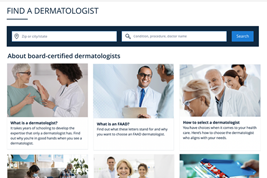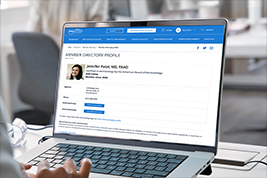Development Advocacy Grant
Three available $20,000 awards.
The Development Advocacy Grant is for state societies that have an advocacy infrastructure in place, some history of advocacy experience, a clear legislative goal, motivated leaders and members, but not necessarily all the needed financial resources.
States that qualify for this grant have received less than $40,000 or fewer than 10 awards from the AADA State Advocacy Grant. If you are not sure whether you meet this qualification, please reach out to Lisa Albany (lalbany@aad.org) or Victoria Pasko (vpasko@aad.org). States that have not engaged in advocacy and lack the infrastructure required for this financial award will be able to access resources through the State Society Relationships Committee. Contact Lisa Albany (lalbany@aad.org) for more information.
States must also meet a threshold of certain criteria upon submission of their application. The criteria is used to validate a state society’s current advocacy infrastructure and to determine whether the state society has the ability to use the grant effectively in pursuing a legislative goal. The criteria will be listed in the application and answered in a yes or no format.
Application timeline: The State Advocacy Grant application opens on June 30 and closes on Sept. 30.
Apply for the grant
Fill out our online form to apply for the grant. Apply by Sept. 30.
Apply nowApplicants must be able to participate in advocacy activities according to their tax status with the IRS and any applicable state regulations.
The grant must be strictly used for advocacy purposes — to influence legislation and/or regulatory issues or to develop such initiatives.
AADA will not approve any grant applications for proposals that are not aligned with the AADA’s state policy priorities.
Applications must be focused on one legislative or regulatory goal and accompanying plan to be funded through this grant. Applications cannot contain a list of potential legislative issues that would be funded by the AADA grant. The state society is encouraged to work on other issues as needed but those activities are not supported by an AADA State Advocacy Grant.
Each grantee will be required to submit a final written report (PDF) to the AADA outlining the status of its advocacy project and progress made to date. Failure to submit a report could result in denial of future funding requests.
Applicants must be prepared to upload the following documents.
Proposed advocacy project: Provide a description of the proposed advocacy project that addresses the following. View a sample application (PDF).
- Issue – Which issue will be addressed? Please review the AADA’s advocacy priorities. The advocacy initiative that is the subject of the grant must align with the AADA’s advocacy priorities and must focus on one priority.
- Goal – What is the advocacy goal? For example, “We plan to defeat an upcoming NP independent practice bill.”
- Description of plan – Please provide an advocacy plan detailing the society’s specific strategies and activities planned to meet the goals.
- Advocacy program – Describe what the state society is doing to grow its advocacy program and ultimately become fully self-funded?
- Budget – Provide a projected budget for the advocacy project that specifies how the grant funds will be used (budget for the project, not for the society).
State society officers (current officers and upcoming): This information enables AADA staff to contact state society leaders who will have knowledge about this grant during the application process and implementation of project.
W-9 form
Form 990 (required for tax purposes)
Grant report: This requirement only applies to states that received a grant in the immediate previous year. A state society must provide a report once the state legislative session adjourns. The report must explain how the funds were used and the status of the advocacy project (e.g. the bill passed). If the legislative session has not adjourned by the time the application is submitted, a report on the status of the project must be provided by Sept. 30 to the State Policy Committee or as part of a grant application for the next cycle.
Applicants should be prepared to answer yes or no to the following nine questions during the application process. Applicants only need to meet a certain threshold of “yes” to move forward in the process; we expect most applicants to answer “no” to some of these questions. The purpose of this exercise is to gauge a society’s current advocacy infrastructure.- Does your state society already have an Executive Director?
- Has your state society led an advocacy effort?
- Does your state society currently host an advocacy day involving meetings with state legislators and/or a skin check?
- Do your members participate in state medical society advocacy days?
- Have any state society members hosted an office visit with a state legislator?
- Does your state society already have a contract lobbyist?
- Does your state society already have a legislative committee?
- Does your state society have representation in your state medical society?
- Does your state society have a Political Action Committee?
 Find a Dermatologist
Find a Dermatologist
 Member directory
Member directory
 AAD Learning Center
AAD Learning Center
 2026 AAD Annual Meeting
2026 AAD Annual Meeting
 Need coding help?
Need coding help?
 Reduce burdens
Reduce burdens
 Clinical guidelines
Clinical guidelines
 Why use AAD measures?
Why use AAD measures?
 Latest news
Latest news
 New insights
New insights
 Physician wellness
Physician wellness
 Joining or selling a practice?
Joining or selling a practice?
 Promote the specialty
Promote the specialty
 Advocacy priorities
Advocacy priorities
